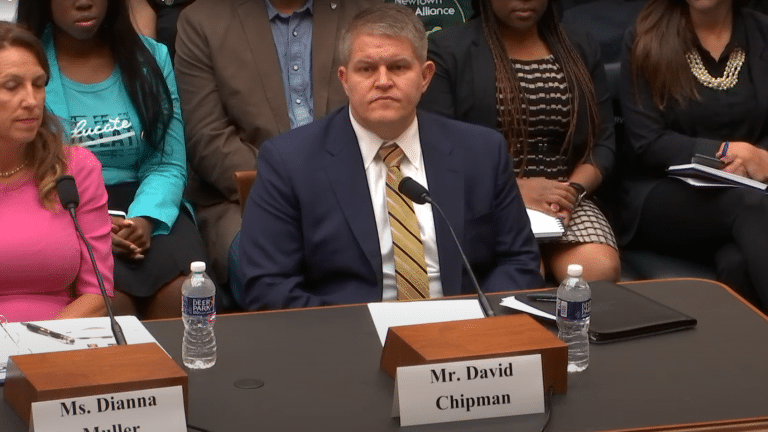President Joe Biden’s failed ATF pick has been on a bit of a media tour lately. This tour has been wrapped in a particular narrative. But it’s one with several problems.
In most major media stories about David Chipman’s nomination being pulled, he is made out to be the victim of a smear campaign orchestrated by the gun industry and a single holdout senator. It’s a narrative Chipman himself has forwarded in interviews with The New York Times, USA Today, and The Trace.
The main villain in this play is the National Shooting Sports Foundation (NSSF). The industry trade group has begun to overtake the NRA in some circles of the gun-control movement. And the ATF nomination has been painted as the group’s coming of age.
The key moment in Chipman’s nomination that led to his downfall, we’re told, is when the NSSF shared a Daily Mail report about his time at Waco in the aftermath of the disastrous government raid on a cult compound. That report included a false accusation that Chipman was pictured standing in front of the ashes of the compound. After the picture was confirmed by the DOJ not to be a picture of Chipman, NSSF removed it from its website.
But the damage was already done, according to Chipman and those covering him. That false picture combined with an unsupported claim he lost his gun seriously harmed his chances. Or so we’re told.
That’s a huge stretch, though.
Yes, the debunked picture has spread around online. But, my Senate sources don’t believe the vast majority of senators even saw it. And none of them ever brought it up as something that impacted their votes in any way.
Instead, Chipman’s nomination was always bound to be a hard sell to any Republican and most moderate Democrats. His years spent working directly for gun-control organizations and making heating, and condescending remarks about gun owners and the industry were always going to be difficult to overcome.
His confirmation hearing performance did not help things. Doubling down on his support for gun restrictions that are more severe than what nearly the entire Democratic caucus is in favor of and failing to define “assault weapon” even while calling to ban them likely hurt his nomination a bit.
And the opposition from the industry surely didn’t help either.
Senator Angus King (I., Maine) does appear to have been swayed by the idea that Chipman was too much of an activist to make a good ATF director. Certainly, the industry argued his history would impact the agency’s relationship with gun dealers. And it’s likely Senator King heard from people in the industry.
But the narrative pushed by The New York Times and others is that Senator King was the lone roadblock, and the industry was the only one making that argument.
First, there were at least four Democratic senators who never publicly committed to voting for Chipman. It’s possible Senators Joe Manchin (D., W.Va.), Kyrsten Sinema (D., Ariz.), and John Tester (D., Mont.) were planning to vote for him anyway, but there’s no guarantee there. After all, Senator Maggie Hassan (D., N.H.) came out and publicly said she’d vote for him. Why not the others if they were ready to pull the trigger?
Second, it wasn’t just the industry who warned Chipman’s appointment would hurt the agency’s relationship with dealers. Current and former ATF agents themselves have made the same argument.
“There’s no system that alerts ATF,” one former agent told The Reload in July. “The person who has to alert us is that licensed dealer. If they don’t pick up the phone and call us, we’ll never know.”
Seven former agents even sent a letter to the Senate Judiciary Committee opposing his nomination on the same grounds.
So, Chipman’s nomination was a hard sell to begin with, and then he had a rough confirmation hearing. After that, nothing but bad news on Chipman’s past came out. He failed to disclose interviews on Chinese state media and deleted many controversial tweets.
Most importantly, ATF agents corroborated the existence of a racial complaint against Chipman. Then, a black former agent directly accused him of attempting to sideline his career with a false accusation of cheating on a promotion exam.
“I believe it had to have been a bias,” the agent, who spent more than 25 years at the agency, told The Reload in August. “My answers were just ‘too good.’ And my thought is he just said, ‘this black guy could not have answered this well if he wasn’t cheating.'”
The agent’s story and the previous allegations of racist remarks received little attention in the aftermath of the nomination, even though they had far more impact on the Senate fight than the fake Waco picture. Major media outlets from The Washington Post to CNN and MSNBC skipped the allegations altogether even though they led every Republican on the Judiciary Committee to call for a second hearing and Minority Leader Mitch McConnell to call for his withdraw.
To their credit, after The New York Times skipped the accusations, USA Today and The Trace asked Chipman about them. He confirmed he did allege a black agent cheated on a promotion exam but denied any racial motive.
“There was no way I would have made it out of ATF honorably if there was merit to any of that,” Chipman said. “My frustration was that DOJ knew all of these facts and could have put a quick end to it. It hurt me personally.”
However, the mention of the story comes well after the previously-mentioned narrative and a slew of Chipman’s own complaints.
And Chipman does have some legitimate complaints with the Biden Administration. If the administration did nothing to help him prepare for his confirmation hearing, that’s political malpractice. Ahe’se’s right that the White House remained practically silent while the negative stories about him poured out.
However, unlike what Chipman claimed, the Department of Justice did defend him against accusations of racism.
Either way, it’s odd to watch major media frame Chipman’s story as a tragedy with him as the victim. The black agent he accused of cheating claims he was exonerated but said the ordeal sidelined him for several years nonetheless. He never got a promotion and retired a few years, disillusioned with the agency where he worked 25 years.
If there’s a victim in this story, it’s him.






Only Members can view comments. Become a member today to join the conversation.